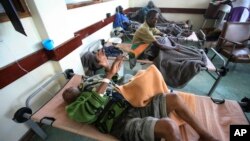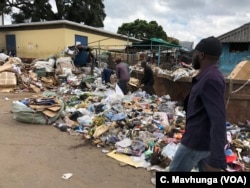Lizzy Maupa uses a bucket to transfer water she used to bathe from her tub to her toilet.
She has a four-week-old baby and a three-year-old child, but the city water supply has not been working for a month, says Maupa.
So she collects water from a nearby river, which she boils to drink. Maupa is being extra careful after Zimbabwe's Ministry of Health on Thursday announced an outbreak of cholera in their part of the city.
"I have heard about it. I heard on the news last night," she says. "So I am trying to be hygienic so that I can take care of the little ones. It has been difficult. I have too many water demands."
Zimbabwe's outgoing Health Minister David Parirenyatwa told reporters late Thursday approximately 40 people were being treated for cholera and five had already died from diarrhea and vomiting, typical symptoms of the water-borne disease.
During a visit to a temporary cholera treatment camp in Harare, he warned people to wash their hands and drink only clean water.
"It is usually a problem of contaminated water. These people were drinking water from, we suspect from one or two boreholes that our team has gone to take samples from," he explained. "If they are contaminated, they will be decommissioned for now. Those that we have here are getting much, much better. As usual prevention, prevention, prevention is key otherwise we will have an outbreak throughout the country."
A 2008 cholera outbreak in Zimbabwe lasted over a year and killed about 5,000 people.
It was stopped only after international groups like USAID donated drugs and water treatment chemicals.
The head of Zimbabwe Doctors for Human Rights Calvin Fambirai warns the country must improve basic sanitation to prevent further outbreaks.
"The conditions that necessitate the spread of cholera and typhoid in Zimbabwe haven't changed," he warned. "They are becoming worse by the day. The first problem we face is authorities haven't been giving resources necessary for the improvement of service delivery in the country to make sure that these archaic diseases do not continue to break out."
Poor hygiene, water quality and waste disposal in densely populated areas remain unsolved, notes Fambirai.
Residents often go for weeks without running water or waste collection.
Health Minister Parirenyatwa said the sanitation situation would improve a promise that many have heard before.







